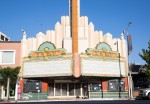UCLA’s recent purchase of a historic theater is the newest in a long string of local property acquisitions by the university in Westwood.
The UCLA School of the Arts and Architecture announced its acquisition of the Crest Theater in Westwood in late October. The Crest, soon to be the UCLA Nimoy Theater, is expected to open in 2021 after undergoing renovations and upgrades to the venue. It will be operated and managed by the Center for the Art of Performance at UCLA.
Kristy Edmunds, executive and artistic director of CAP at UCLA, said ownership of the Crest Theater allows CAP to host more small productions than a rental space or Royce Hall would allow. While smaller venues exist on campus, they’re almost exclusively teaching spaces and are rarely available for student use, unlike the Crest, Edmunds said.
“This is about trying to anticipate a future set of needs of artistic culture from another generation where you can practically hand the master keys to them, symbolically speaking, and say you belong here, this is also part of you,” Edmunds said.
The Crest, along with the Hammer and Fowler museums, which are also owned by UCLA, serve to expose students to artists from around the world and provide artists access to the audiences of Los Angeles, Edmunds said.
“Established artists will participate,” Edmunds said. “But young artists who are not yet household names need to get a foothold somewhere.”
Matt Ceragioli, associate director of the UCLA real estate department, said in general, UCLA buys properties off campus depending on what division of the university needs property. Recently, UCLA purchased a 10-story office building in Westwood to accommodate university growth and reduce long-term occupancy costs.
“University leadership makes the decision on whether investing the capital is something that’s worth exploring for a particular asset,” Ceragioli said.
Andrew Thomas, executive director of the Westwood Village Improvement Association, said he thinks businesses benefit from UCLA-owned institutions like the Crest.
“I am very excited about (the UCLA purchase of the Crest). Those cultural institutions are destinations for us,” Thomas said. “People choose to go to the Hammer and (the Geffen Playhouse) and they have a great time and then they come have dinner in our district.”
Thomas added Westwood Village is currently at around 15 percent vacancy. One factor preventing new businesses from opening in the Village is the Westwood Village Specific Plan, the master planning document that outlines local zoning regulations, Thomas said.
The Specific Plan for Westwood Village was created in 1989 and last updated in 2004. While the association cannot make policy changes itself, Thomas said it plans to recommend changes to the way food and restaurants are defined to allow more casual eateries, like Tender Greens, to move in. The current specific plan also requires new property owners to build parking on site or secure parking in perpetuity at another site.
“We’re kind of stuck,” Thomas said. “Those are the two greatest regulatory challenges.”
Ceragioli said while private developers are bound by local laws, UCLA has more flexibility.
“Because the university is part of the Regents, which is the state of California, we’re not subject to city and local jurisdiction when it comes to development and zoning rules,” Ceragioli said.
However, the university still aims to respect the community’s wishes, Ceragioli said.
UCLA was able to utilize this exception during its construction of a new 20-story building on Le Conte Avenue as part of a UCLA Extension project. After a community impact hearing, UCLA reduced the height of the building to 17 stories, but maintained less parking than a private developer would need.
UCLA is in the process of adding 6,835 student beds starting this fall on the Hill and in Westwood Village.
“(The residential developments) are hugely exciting,” Thomas said. “They are going to experience our district everyday. … The more residential we have close to us, the better off we are.”
Thomas added he thinks UCLA and the Village are part of the same community, and the university is important to the economic future of the Village.
“UCLA has been here longer than Westwood Village, but we’ve grown up together in a lot of ways,” Thomas said. “I do see us as a neighborhood-serving resource and UCLA is a huge part of our neighborhood.”
